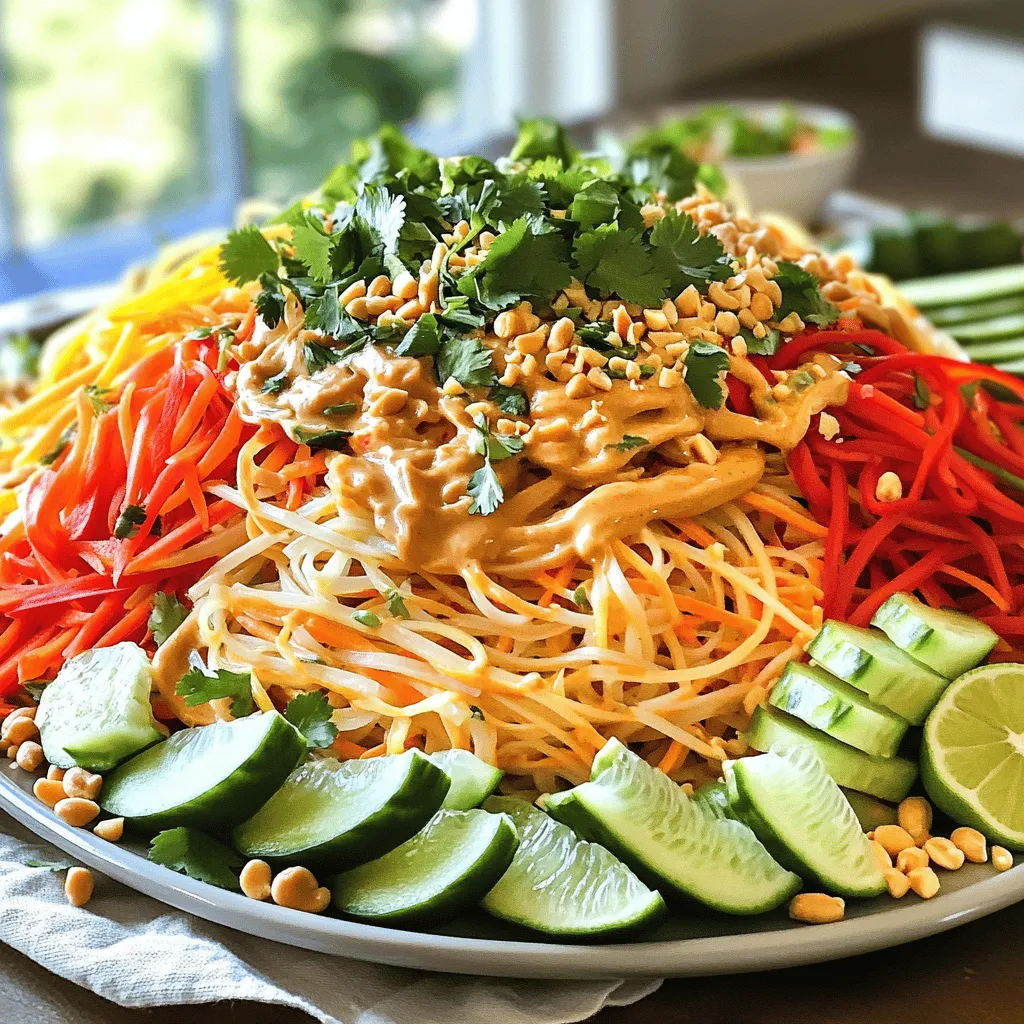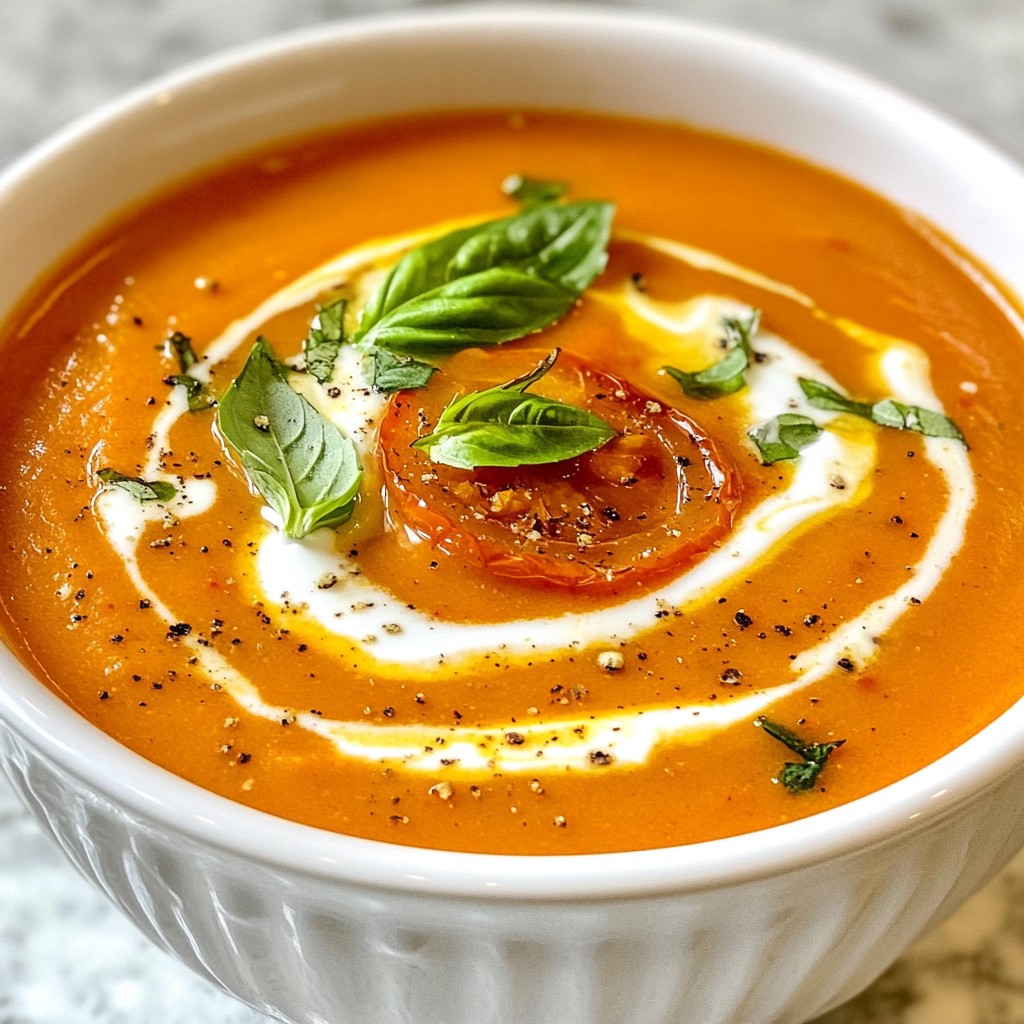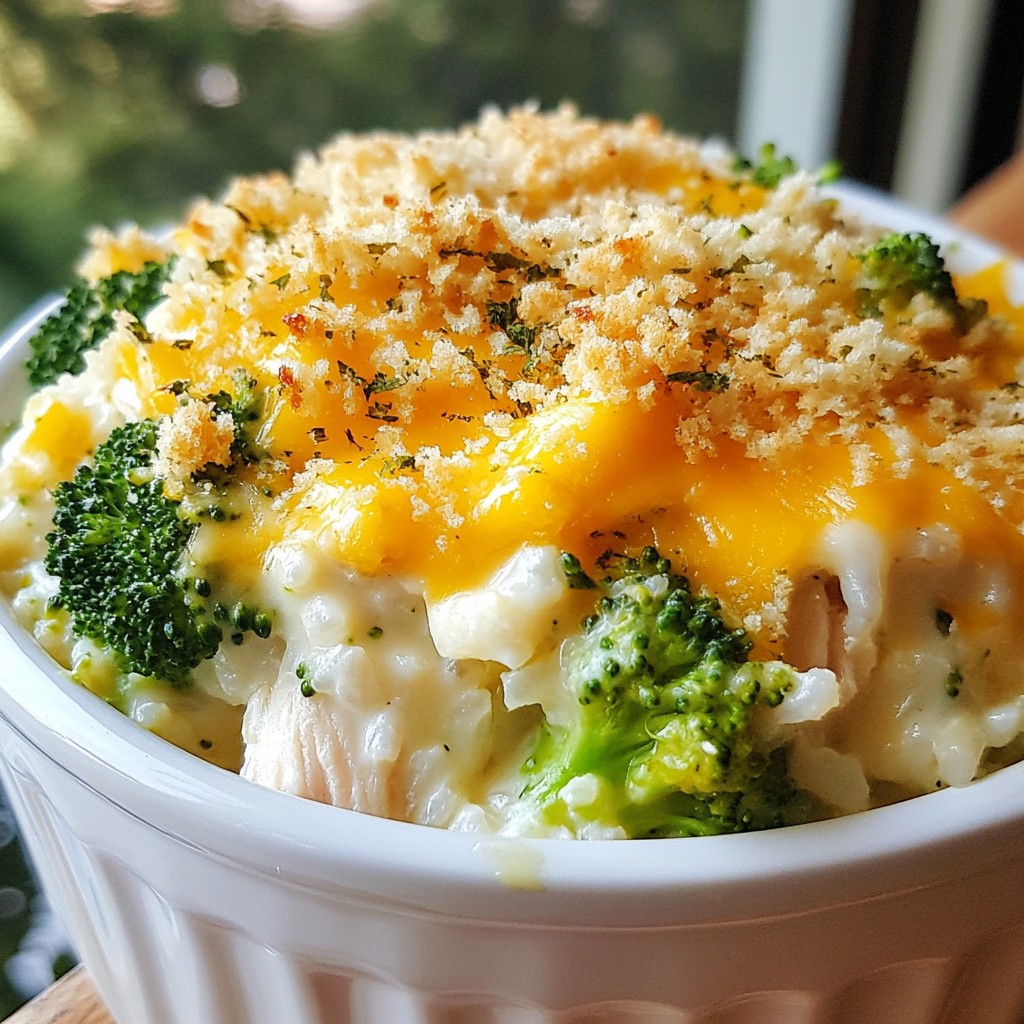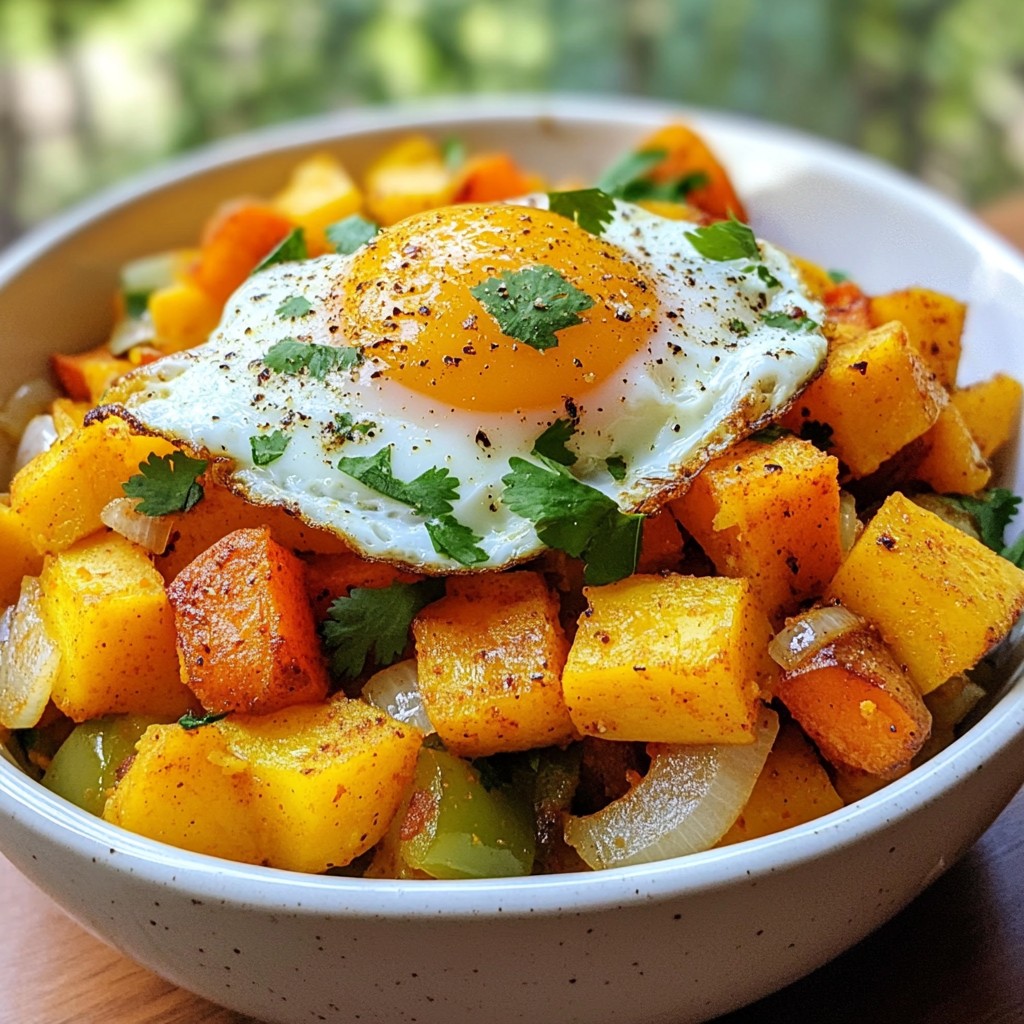Are you craving a quick and tasty dish? Look no further than Thai Peanut Noodles! This easy recipe is packed with flavor from fresh veggies and a creamy peanut sauce. You’ll love how simple it is to make at home. Join me as we dive into a world of delicious ingredients and fun cooking tips that will elevate your dinner game. Let’s whip up something amazing together!
Ingredients
Main Ingredients for Thai Peanut Noodles
– 8 oz rice noodles
– 1 cup shredded carrots
– 1 cup bell peppers (red and yellow), thinly sliced
– 1 cup cucumber, julienned
– 1/4 cup green onions, chopped
– 1/4 cup fresh cilantro, chopped
For Thai Peanut Noodles, rice noodles are the star. They are soft and chewy, perfect for soaking up all the flavors. Fresh vegetables add crunch and color. Carrots give a sweet bite, while bell peppers bring a slight tang. Cucumber adds a refreshing touch. Green onions and cilantro round out the dish with extra flavor.
Peanut Sauce Ingredients
– 1/4 cup peanut butter (creamy or chunky)
– 2 tablespoons soy sauce (or tamari for gluten-free)
– 2 tablespoons lime juice
– 1 tablespoon maple syrup or honey
– 1 tablespoon sesame oil
– 1 teaspoon ginger, grated
– 1 garlic clove, minced
– 1/4 teaspoon red pepper flakes (optional, for spice)
– Water (to adjust the sauce consistency)
A good peanut sauce makes this dish shine. Peanut butter is rich and creamy. Soy sauce adds salt and umami. Lime juice gives a bright, tangy taste. Maple syrup or honey adds a hint of sweetness. Sesame oil brings a nutty flavor. Ginger and garlic boost the sauce’s warmth. Red pepper flakes add a kick, but you can skip them if you prefer. Mix these together for a delicious sauce that coats the noodles perfectly.
Step-by-Step Instructions
Cooking the Rice Noodles
First, boil water in a large pot. Once boiling, add the rice noodles. Cook them as per the package instructions, usually about 8-10 minutes. You want them soft but not mushy. After they are done, drain the noodles in a colander. Rinse them with cold water. This stops the cooking and keeps them from sticking. Set the noodles aside while you prepare the sauce and veggies.
Making the Peanut Sauce
In a medium bowl, mix all the ingredients for the peanut sauce. You will need peanut butter, soy sauce, lime juice, maple syrup, sesame oil, ginger, garlic, and red pepper flakes if you want some heat. Whisk everything together until it is smooth. If the sauce seems too thick, add a little water. Stir until you reach your desired consistency. The sauce should be creamy but pourable.
Mixing and Serving
In a large mixing bowl, combine the cooked noodles with the fresh veggies. Use shredded carrots, thinly sliced bell peppers, julienned cucumber, and chopped green onions. Pour the peanut sauce over the noodle and veggie mix. Toss everything gently. Make sure each noodle is well-coated with the sauce. Serve the Thai peanut noodles on plates or a large platter. Garnish with fresh cilantro for extra flavor. Enjoy this tasty dish!
Tips & Tricks
Perfecting the Peanut Sauce
To get the best consistency for your peanut sauce, start with creamy peanut butter. It blends easily. If you use chunky, just stir well. Whisk all the sauce ingredients together: peanut butter, soy sauce, lime juice, maple syrup, sesame oil, ginger, garlic, and red pepper flakes. If the sauce is too thick, add water slowly. Mix until you reach a smooth texture.
If you have allergies, you can swap out some ingredients. For peanut allergies, try sun butter or almond butter. Tamari works well instead of soy sauce for gluten-free diets. Maple syrup can be replaced with agave syrup for vegan options. These swaps keep the flavor strong.
Presentation Ideas
Presentation matters! Serve your Thai peanut noodles on a large platter. This looks great for family meals or parties. Drizzle extra peanut sauce on top for a glossy finish. Add sliced lime wedges around the dish for a fresh look.
For garnishes, sprinkle fresh cilantro over the noodles. You can also add crushed peanuts for crunch. Red pepper flakes give a nice pop of color. Arrange everything neatly to make it appealing. These small touches make your meal special and fun!
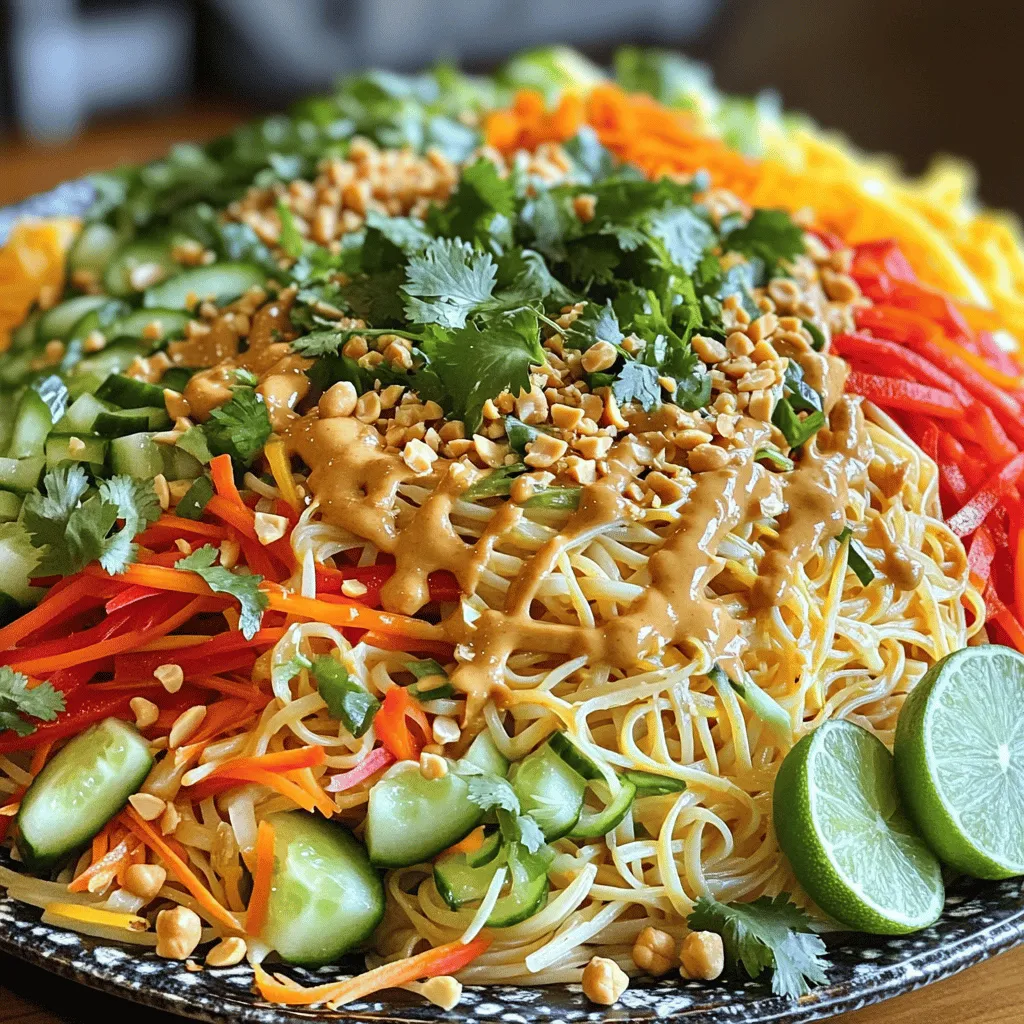
Variations
Protein Additions
You can add protein to your Thai Peanut Noodles to make them heartier. Common choices include chicken, shrimp, or tofu. To add chicken, cook sliced pieces in a pan until they are no longer pink. For shrimp, sauté them until they turn pink and opaque. If you prefer tofu, press it to remove moisture, then cut it into cubes and fry until golden.
After cooking your protein, mix it in with the noodles and vegetables. This adds great flavor and makes the meal more filling. You can use any protein you like. Just make sure to adjust cooking times based on what you choose.
Vegetable Substitutions
Feel free to get creative with your veggie choices! Seasonal ingredients can make your dish fresh and exciting. Swap out bell peppers for snap peas or add in some broccoli florets. You can also use zucchini or asparagus for a different taste.
Adding more vegetables not only boosts nutrition but also adds color and crunch. You can mix in leafy greens like spinach or kale. Just sauté them briefly before adding to the noodles. The more veggies, the better! They enhance the flavor and make the dish more enjoyable.
Storage Info
Refrigeration Guidelines
To store leftover Thai Peanut Noodles, first, let them cool. Place them in an airtight container. This keeps them fresh and safe to eat later. You can store them in the fridge for up to three days.
For the peanut sauce, keep it separate from the noodles. Store the sauce in a small jar or container. It can last about a week in the fridge. If you see any signs of spoilage, throw it out.
Reheating Instructions
When you’re ready to eat the leftovers, use a pan or microwave to reheat. Heat the noodles gently on medium. Add a splash of water if they seem dry. This helps bring back moisture.
To avoid soggy noodles, do not overheat them. Just warm them enough to enjoy. Mixing in fresh veggies can also help maintain texture. Enjoy your Thai Peanut Noodles again!
FAQs
Common Questions about Thai Peanut Noodles
What kind of noodles can I use?
You can use rice noodles for this dish. They cook quickly and soak up flavors well. If you prefer, you can also try soba noodles or whole wheat pasta. Each type will give the dish a different texture. Just make sure to cook them according to the package directions.
Can I make this recipe ahead of time?
Yes, you can make this dish ahead of time. Prepare the peanut sauce and chop the veggies. Store them separately. When ready to eat, cook the noodles, mix everything, and enjoy! This makes for a quick meal when you’re busy.
Dietary Considerations
Is this recipe gluten-free or vegan?
Yes, this recipe can be gluten-free. Just use tamari instead of soy sauce. It’s also vegan since it has no animal products. The peanut sauce is rich and creamy without dairy.
How to modify for nut allergies?
If you have nut allergies, try using sunflower seed butter. It has a similar texture and flavor. You can also skip the nut butter altogether and use tahini for a different taste.
Pairing Suggestions
Best side dishes to serve with Thai Peanut Noodles
Serve with a light salad or spring rolls. These add fresh flavors that balance the rich peanut sauce. Cucumber salad with lime dressing is also a great option.
Beverage pairings for a complete meal
Pair these noodles with iced tea or light beer. A fresh coconut drink will also enhance the meal. For something warm, a cup of herbal tea is soothing and complements the flavors.
Thai Peanut Noodles are a tasty dish with many ingredients and easy steps. We talked about the main ingredients like rice noodles, fresh veggies, and a rich peanut sauce. You learned how to cook the noodles, make the sauce, and mix everything well. Don’t forget tips to make it better, like adding protein or garnishes. This dish stores well and reheats nicely too. Now, you can enjoy a simple yet delicious meal anytime! Give it a try and make it your own.
